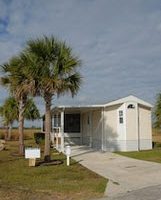Bankruptcy & Mobile Homes in Florida

Indebted consumers in Florida can typically choose between two bankruptcies—Chapter 7 or Chapter 13. With a Chapter 13, consumers do not lose any property, but they will need to stick to a repayment plan for 3-5 years before debts are discharged.
With a Chapter 7, however, debtors can lose non-exempt property, which the trustee will use to pay back unsecured creditors. Helpfully, the state of Florida has exempted certain property, effectively preventing the trustee from taking and selling it.
Florida has a generous homestead exemption, allowing permanent residents to exempt the full value of their homes. But does this exemption apply to mobile homes?
Mobile Homes are Exempted
Florida has two homestead exemptions—a constitutional one and a statutory one. Because the constitutional exemption was too narrow, Florida’s legislature supplemented it and exempted even more property, including mobile and modular homes. Under Florida Statute § 222.05, any dwelling house, including mobile or modular homes, not on their own land, can be exempted.
Because the mobile home is exempt from the trustee, you cannot lose it if you file for a Chapter 7 bankruptcy. This doesn’t necessarily mean Chapter 7 is the best choice for you. More factors go into the analysis than whether you will lose your mobile home. However, it does provide a measure of comfort to indebted consumers that they can’t be thrown out onto the street if they do end up filing for Chapter 7 protection.
There’s Even Better News for Mobile Home Owners
Mobile home owners benefit even more under the bankruptcy laws. If their mobile home is on leased land, then they also get to use a $4,000 wildcard exemption, which is not available to most homeowners.
Here’s how it works. With the wildcard exemption, a debtor can exempt up to $4,000 in any property that they want. So if you have $4,000 in jewelry that you don’t want to lose, you can exempt it. If you have a tax refund coming to you, you can exempt up to $4,000.
But most homeowners do not get a wildcard exemption. Indeed, the law states that you are only eligible for the wildcard if you cannot claim the homestead exemption under the state’s constitution.
But if you use the statutory exemption (instead of the constitutional one), then you get to keep your home and you get to use the $4,000 wildcard exemption. So you can use that money to exempt anything you want!
Choosing the Right Bankruptcy for You
If you are considering filing for bankruptcy protection, then you need accurate legal advice about your options. It is possible to come out of bankruptcy while retaining most of your assets, but you need to thoroughly analyze which option is best for you.
Contact Nowack & Olson today. Our Plantation bankruptcy attorneys have been helping debtors in South Florida for years. We have seen every bankruptcy possible and are eager to put our experience to use on your behalf. Please call 888-813-4737 to schedule a free initial consultation.
Resource:
flsenate.gov/Laws/Statutes/2012/222.05
